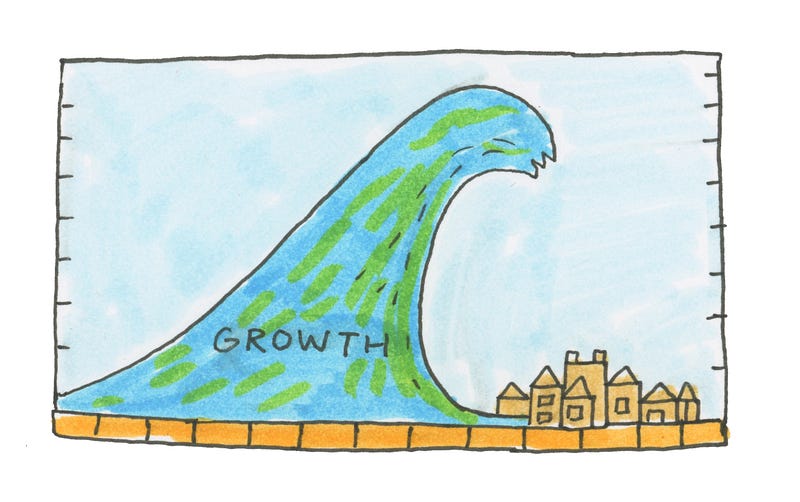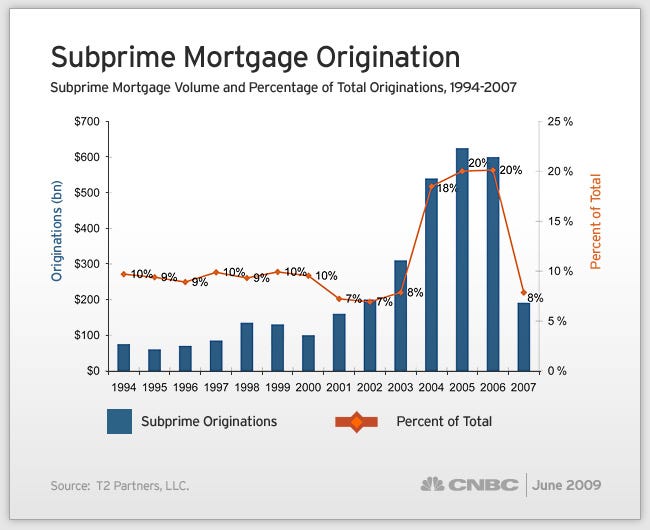
Exponential growth devours and corrupts
There
is no higher God in Silicon Valley than growth. No sacrifice too big
for its craving altar. As long as you keep your curve exponential, all
your sins will be forgotten at the exit.
It’s
through this exponential lens that eating the world becomes not just a
motto for software at large, but a mission for every aspiring unicorn
and their business model. “Going viral” suddenly takes on a shockingly
honest and surprisingly literal meaning.
The
goal of the virus is to spread as fast as it can and corrupt as many
other cells as possible. How on earth did such a debauched zest become
the highest calling for a whole generation of entrepreneurs?
Through systemic incentives, that’s how. And no incentive is currently stronger than that of THE POTENTIAL.
It
used to be that successful, upcoming companies would show a prudent mix
of present-day profits and future prospects, but such a mix is now
considered old-fashioned and best forgotten. Now it’s all potential, all
the time.
This
trend didn’t start yesterday. We can’t blame the current crop for soil
spoiled five harvests ago. No, this singular focus on potential,
forsaking all present-day considerations, was cultivated by some of our
current giants.
It’s
companies like Salesforce that have shown just how long you can live on
potential alone. Just how large and sprawling you can become without
ever bothering to show much if any profits. There’s a decade and more’s
proof that growing like a virus, gobbling up other businesses to cling
to the exponential, is how you can be “successful”.
There’s
always more potential. Always another idea or domain that can be
devoured. But this is also the straight path to devolution and its
distortions. Bright ideas boiled free of all that is good and left dry
as bones.

Have
you tried Angry Birds lately? It’s a swamp of dark patterns. All
extractive logic meant to trick you into another in-app payment. It’s
the perfect example of what happens when product managers have to
squeeze ever-more-growth out of ever-less-fertile lands to hit their
targets year after year.
It’s
straight out of the split-pea soup parable. What if we removed just
three peas? Nobody can tell. The factory can save a few million. The
executives who pushed that idea can get their yearly bonus. No harm, no
foul? But nothing ever stops at the quarterly win. There are four
quarters to a year. Forty to a decade. Every one of them has to produce,
exceed, and beat EXPECTATIONS.
Because
the core assumption is that growth is always good, growth is always
unlimited, and if you’re not growing you’re dying. Swim or sink, no
wading.
It’s
the banality of moral decline. No one person sits down and imagines
that Angry Birds of 2009 becomes the Angry Birds of 2017. A fun, novel
game turned into a trashy slot machine. Nobody is proud of work like
that. But it happens. One pea at a time. Until the split-pea soup has no
more peas.
We
cannot expect otherwise. It takes superhuman strength to resist the
compound expectations of quarterly growth targets linked to an
exponential moon shot. The list of comic-book heroes capable of such a
task is so short that we’ve already deified the few, like Steve Jobs,
who held the line. (And who knows where he would have gone given another
decade or two?)

Remember
“Don’t be evil”? Google’s iconoclastic corporate slogan that slowly but
surely accumulated so many caveats and exceptions that it needed as
much legalese as a terms of service agreement. Principles are no match
for the long-term corrosion of market realities and expectations. The
levies will break, the good intentions will flood.
But
back to the incentives. It’s not just those infused by venture capital
timelines and return requirements, but also the likes of tax incentives
favoring capital gains over income.
What
sucker wants to earn $10 million/year at a 52.5% tax rate when you can
get away with hundreds of millions in one take at just 15%? Nobody,
that’s who.
It’s
hard to argue that boards, founders, and their financiers aren’t just
doing exactly what the incentives are coaxing them to do.
Which
is why growth is now everything and residual value is nothing. In fact,
the latter can be outright harmful to the former. When you’re being
priced on the hopes and dreams of potential, reality can be a dangerous
and undesired competitor. Best just to appeal to the exponential curve
and let the imagination roam free. An epic capital gains score awaits!
Given
how pervasive this worship of potential and growth has become, it
wasn’t surprising that when we pruned the product portfolio at 37signals a few years back, and left only Basecamp,
the reaction was mostly one of incredulity, or even anger. Either we
were cutting businesses that were devoid of financial merit, or they had
merit, and we were thus per definition crazy to let them die. Crazy to
turn down growth. To summarize the ethos of the comments sections back
then: If something is creating revenue, it’s your solemn duty to keep
milking and pumping until it’s done! Extract every cent, then move on to
the next mining effort.

The
fancy word for that is fiduciary duty. To grow as fast as inhumanely
possible is not just a goal, but a responsibility. A moral obligation to
THE MARKET.
And the theory goes, the market is all of us*. So you’re actually
serving your community. All that is bad is good again once you change
the tint of your glasses. If you sense something rotten, you just need a
new prescription. Now you’ll see as clear as fog that this is ACTUALLY ABOUT ETHICS IN BUSINESS.
The
true puppeteer behind this homogenization of startup aspirations is
diversification theory. Decisions are not driven by what’s good for a
single company, its employees, and its customers. No, it’s what’s good
for the basket.
These
baskets are known as venture capital funds. That’s the pipeline through
which virtually all recent tech companies that have reached the public
markets were sent. It’s a gladiatorial arena with the explicit goal that
if enough businesses in the basket aren’t failing, the fund isn’t
trying hard enough! Not dreaming big enough! Be more outrageous! Be more
crazy!
It’s
a hyper-evolutionary process that rewards the most extractive, most
addictive, most viral strain from the cohort. The key measurement is ENGAGEMENT. Who cares about the virtue of the endeavor, as long as your product is maximally addictive.
Engagement,
of course, is not a new pursuit. It’s just the latest euphemism for
what we used to call capturing eyeballs. But I guess that was a bit too
blunt and honest to survive the sanitization of the industry. The
collective ecosystem learns and adapts at an incredible pace, including
how best to position its image to incite the least amount of skepticism.
They have better words now to hide the same scheme in plain sight. The
normalization of questionable motives in the public perception is key to
enabling the next iteration to proceed without obstacle.
And
iterate they do. At a furious pace. Every new fund is competing against
the survivors of the last one and the more purpose-bred contenders of
the current one. It’s what makes looking at the values and principles of
today so fascinating and frightening. If this is where things stand in
2016, what does 2020 look like? 2024? 2030? The mutations will continue.
And they absolutely will not stop until every last one of us has been
through the funnel and converted to a servile consumer as ingredients in
the sludge of growth.

Innovation,
risk, and morals are being packaged with ever greater efficiency
through startup accelerators that take the raw ingredients, preferably
pattern-matched look-alikes of Zuckerberg, and turn them into
securitized batches of startups. Whole tranches of burgeoning businesses
packaged into Spring and Fall cohorts. This packaging has turned out to
be a great model for the packagers. Many small sums spent on 7% of
ownership. If you package enough entrepreneurial product, your actuary
tables will line up beautifully.
And
you get to indoctrinate these seeds with the values and practices of
the most successful viral strains from last season. Genetically
modified, cloned, and inoculated startup founders with all the right
bits, flipped to ensure the greatest chance of the biggest yield.
But
what is a conscientious objector to do? Time waits for no one, and only
the Luddites think that their home too won’t one day soon be configured
with BUY NOW buttons for all the beloved BRANDS. Controlled by a
friendly bot in the cloud that learns all your habits, preferences and
titillations one command at a time. Data mining has also successfully
been rebranded to the more palatable Machine Learning. Who wants to stop
anyone, human or machine, from learning? What are you, the digital
taliban?
So
too with the startups themselves: “If we don’t, we’re leaving money on
the table!!”. Has there ever been a more gluttonous justification for
guiltless business practices?
 |
Could
it be that perfecting the most viral superbug — until the final strain
is discovered that really DOES devour the whole world — isn’t what the
whole startup community should be focused on? What if we opened our eyes
to non-exponential startups and the needs they may have instead.
But
again, don’t you know businesses are valued on future potential, not
present reality? Yes I do. And that’s my objection. Surely a mix is
prudent, but the spectrum has gotten out of whack. To the point where
the present is entirely discounted by the lure of the future. And the
past, what it took to get where we are, is either ignored or forgiven.
Mistakes may have been made, but tomorrow is an entirely new day,
divorced from any of the days that went before it. It’s a constant cycle
of absolution combined with a community-induced amnesia to past
transgressions. It’s just more efficient that way.
Technology
isn’t the only industry that grapples and struggles with growth, so we
can learn from studying others suffering the same pressures. Take the
drug business. It costs staggering sums to develop a new mass-market
drug, and it’s a risky endeavor, so we reward the explorers with a
patent monopoly when they strike gold. But it’s not a permanent one.
There’s a time limit, and after that generics distribute the gains of
progress widely without the yoke of a profit-maximization goal.

What
if we thought about how we could apply some of that to the world of
software? How can we turn more of the Twitters and Facebooks and Googles
into generics? What shifts in underlying technology and cost do we need
to hit to make it feasible to run something like Twitter on Wikipedia’s
budget (and fund it by donations rather than ads)? What if the next Big
Idea looked more like email and less like the walled gardens of today?
We’ve
made this transition at the infrastructural level, to some extent.
Technological and algorithmic advances from closed-source software have
been turned into generics via open source. With spectacular commercial
success, no less. As one boat sinks, a thousand new ones float. One
software company or product’s death is easier to celebrate, rather than
mourn, when you know the intellectual organs are giving life to ten new
ones.
Additionally,
startup culture used to focus a lot on the personal risk of the
founders and early employees. To a nauseating degree, yes. This heroism
was the justification for all the spoils there were to come. These days,
there’s a lot less talk of existential risk because there’s a lot less
of it. There’s so much money floating around that for many founders, the
risk is mostly gone. At least in the financial sense, if not in the
moral and time-opportunity sense. Failure is celebrated to such a degree
in part because the system needs to recycle able bodies as quickly as
it can to keep the overall system growing. Spent three years on a
startup that didn’t work out? No sweat, bro. Here’s a hug and a reboot
and a new bag of money to try again. You’re here just in time for my
next fund!
Now
some of that is clearly good. Less extreme risk means, at least in
theory, greater access for more people to participate in the startup
lottery. But it also has some clear downsides of detachment. If this go
is just one of many, if you can always just hit restart, then you’re
probably not as concerned about this specific go-around. So what if we
step over the line a little here. ITS THE HUSTLE, BABY! And besides, if
we miss, no biggie.
Maybe
it’s time we rediscover some personal liability. Limited, yes, none,
no. Complete detachment from the consequences of your choices isn’t
producing the kind of responsibility the world so dearly needs.
But
that’s hard. Of course it’s hard. Not the least because this whole
adventure is so heavily medicated with foosball tables, game rooms, and
bean bags of all colors. As many distractions as possible from having to
consider the true nature of what we’re doing. What’s that about the
rising automatron class? Sorry, I’m late for a nerf battle on the star
deck. Later!
Yeah,
the automatron class. People treated as literal cogs in transportation
and delivery machines. Complete with machine-like tolerance
specifications for quality. Dip below a 4.7? You’re in trouble. No
explanations. No room for a bad day or a bad week because the bills were
mounting. No room for humanity, no room for frailty. Just put on your
happy face and Have A Great Day.

I’ve
been as guilty of this as anyone. When I first discovered Uber, I was
ecstatic. So much less human friction. No yucky money changing hands.
Just in and out. Headphones on and let’s go. The less I had to deal with
the humanity of drivers, the better. Or so I thought.
But
not all that is easy is better. Friction is interaction. Human psyches
rubbing against each other. And in this friction-less society we wonder
how on earth someone could vote Brexit or Trump. It wouldn’t be such a
mystery if we didn’t do all we could to isolate ourselves from the
world.
Yet
we go along with the euphemisms and fantasies. Oh no, no. These people
aren’t cogs, they’re independent business owners! Able to set their own
hours: Like whether they want to drive for 60 or 80 a week to make ends
meet! Aren’t we liberating?

And
I think that’s the truly insidious part of the tech lords solution to
everything. This fantasy that they will be greeted as liberators. When
the new boss is really a lot like the old boss, except the big stick is
replaced with the big algorithm. Depersonalizing all punishment but
doling it out just the same. Maybe the old cabbie boss was an asshole,
but at least that asshole had a face. Someone you could yell at. Have
you tried yelling at an algorithm or a customer-rating average?
It’s
just another mass-scale exploitation project. And by exploitation, I
mean that less in a shackles and bone-soup sense — although there’s a
good discussion to have around that too — but more in a pennies for you,
billions for me kind of way. Enormous wealth being extracted from
people living subsistence lives. But rather than being seen as modern
sweatshops, we are all cheering this on as unadulterated progress.
Anyone who’s in opposition to this exploitive process is a crank, as Michael Foley would say. Any community that may have reservations about how this is happening is a shit-hole.
Now
that doesn’t mean that there aren’t all sorts of vested, crony
interests in keeping innovation at bay. Surely there are. But there’s
more than that. There are a whole host of legitimate reasons why we have
government regulations around housing and transportation.
Inconveniences to the march of Instacart and Uber to turn everyone into a temporary gig worker.
This
exploitation isn’t just for the workers of the Uber or the neighbors of
Airbnb. It’s also all of us through the algorthimization of news at the
House of Facebook’s behest. More engagement. More rage, more fake news,
all resulting in more hours spent, more eyeballs fixated, more clicks
and taps made.
And
this new world order is being driven by a tiny cabal of monopolies. So
commercial dissent is near impossible. Do you want to be the weirdo
without a Facebook account? The uncool stooge for staying at a motel or
taking an old-school cab? Of course not. You’re hip, you’re with it.
Everything worth doing is in an app.
So
it remains mostly our fault. Our choice, our dollars. Every purchase a
vote for an ever more dysfunctional future. We will spend our way into
the abyss.
If
nothing changes, we’ll continue to vest the tech titans and their lords
with economic monopolies that grant them undue power. They’re too big
to be conscientious. “Don’t be evil” is a slogan for an upstart, not a
conglomerate. You simply can’t distribute such noble a moral codex
across endless divisions, all with their own P&Ls.

And don’t fall for the soothing charity by the extractive victors either. That charade is as old as time.
It’s the process by which ruthless tech lords seek to rebrand
themselves into noble benefactors for the good of society. By giving
back some of their spoils as they see fit. Kings of plenty doling out
gifts and mercy. Don’t buy it. And I don’t mean that in the sense that,
say, Bill Gates hasn’t done good with his fortune. But that society
isn’t better off when we have to rely on magnanimous tech lords to solve
its ills by decree.
Incumbent
power centers will not go quietly into the night, though. Excuses will
be aplenty, because unlike the robber barons of old, they’re not going
to defend themselves with water canons and lock-outs. It’ll be cold war
skirmishes fighting for fake moral high grounds. Natural monopolies!
Network effects!
Because
competition is for the little people. Pitting one individual contractor
against another in a race to the bottom. Hoarding all the bargaining
power at the top. Disparaging any attempts against those at the bottom
to organize with unions or otherwise. Ragging on that as “untapped
energy”.
When
you accept this entire picture, it’s not so hard to understand why some
people are starting to freak out. I’m freaking out. This is worth
freaking out about.
As Douglas Rushkoff says,
we need a new operating system for startups. The current one will keep
producing the same extractive and monopolistic empires we’ve gotten so
far. No, what we need is a new crop of companies that are
institutionally comfortable with leaving money on the table. Leaving
growth on the table. Leaving some conveniences and some progress on the
board, in order to lead the world into a better direction.
The
solution isn’t simple, but we’re in dire need of a strong counter
culture, some mass infusion of the 1960s spirit. To offer realistic,
ethical alternatives to the exponential growth logic. Ones that’ll
benefit not just a gilded few, but all of us. The future literally
depends on it.
This essay is a follow-up to RECONSIDER.
Right down to the genesis of being a conference talk I didn’t end up
giving (sorry Webstock!). If you haven’t read that yet, you’ll probably
like it, if this tickled your fancy. And you’ll probably also like my
books REWORK and REMOTE. Oh, and I’m writing another one, The Calm Company, right now. Cheers!
Niciun comentariu:
Trimiteți un comentariu